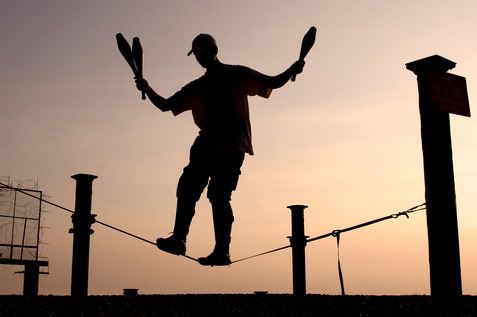When it comes to faith, I doubt.
But it doesn't stop there. Yes, we do have reasonable beliefs; religious faith too can be reasonable. In fact, if epistemic circularity is unavoidable, then every aspect of our life involves some kind of faith.
Still, this doesn't mean we shouldn't doubt our beliefs. More precisely, we should doubt our understanding of the world from which our beliefs arise.
Invariably, there are times when I doubt what I know, doubt that I can be certain about anything but the simplest things. During those times, like the experience the eponymous philosopher of the Bible describes, the good things in life just don't feel as good. Without certainty, one becomes anxious.
Fortunately, I find that the anxiety soon passes, and what I have instead is a refreshing sense of peace. It's a feeling that is akin to floating along a flowing river rather than struggling and going under—it's something that you could only feel if you're willing to ease up on the struggle to maintain certainty.
Indeed, I think perpetual anxiety is our lot if we are so desperate to remain certain. Or, if we never admit it, we would merely be living in an illusory shell. Faith requires lies in order to exist freely and indefinitely without doubt creeping in. And doubt that is not embraced, that is not allowed to come into opposition with our certainties, can only give us anxiety.
Openness of mind, then, is the only real cure to the discomfort that doubt brings.
To be sure, as physical beings, we have physical needs that give rise to a need for some physical and material security. And I think this is a legitimate general need, the satisfaction of which is a worthwhile social goal—hence my support for socialism.
Beyond a certain albeit (granting the possibility that specific needs are subject to change) non-specific point, however, we should probably be more comfortable with uncertainty. And in learning and thinking, we could achieve this by having an open mind, a disposition that does not hold on too tightly to the certainties that we think our understanding gives us.
I suspect that we have been conditioned to loathe uncertainty in most aspects of life. We need to know, we want predictions and projections. Living in society has taught us that this is the way to live. It has become like an instinct, something that drives us mechanically.
And instead of living, in a richer sense of the word, we are letting our shoddily-constructed faiths and mice-and-men plans dictate our lives. I think we become something less than what we could be.
And instead of living, in a richer sense of the word, we are letting our shoddily-constructed faiths and mice-and-men plans dictate our lives. I think we become something less than what we could be.
It seems apt, therefore, to quote the words that Nietzsche put in Zarathustra's mouth:
Man is a rope, tied between beast and overman—a rope over an abyss... What is great in man is that he is a bridge and not an end: what can be loved in man is that he is an overture and a going under. I love those who do not know how to live, for they are those who cross over.
Only doubt is certain; what we do know is that we might not know. And that might not be a bad thing. For one, it might give us a key to overcoming our petty troubles.

(0) Comments
Post a Comment